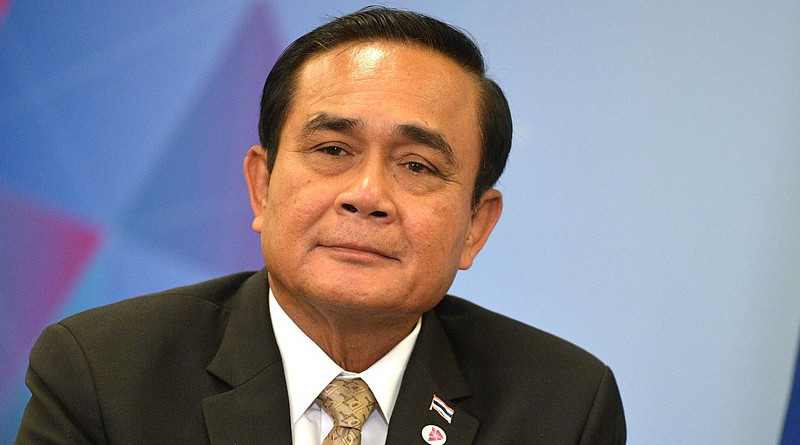Inept Thai PM Compounds Misery – OpEd
By UCA News
By Benjamin Freeman
A Thai man desperate over his financial situation shimmied up a power pole in the seaside town of Pattaya on May 12 and threatened to jump to his death.
A mere day later, Prime Minister Prayut Chan-o-cha stressed at a news conference that health safety measures would continue to take precedence over economic ones in Thailand.
Prayut, who isn’t known for being particularly devoted to poverty alleviation policies, might as well have told that to the man up on the pole and waited for an answer. Then again, he may not have liked the answer.
The man in Pattaya said he had resorted to his desperate act because he had not received a monthly 5,000 baht (US$155) handout the government has promised for newly jobless low-income earners.
If indeed so, he is hardly alone. An estimated seven million Thais — perhaps more — have lost their jobs as a result of a two-month nationwide lockdown. In addition, countless small and medium-sized enterprises, which form the backbone of the Thai economy, have been forced to shutter their doors.
Many may never reopen.
The prolonged lockdown risks crippling Thailand’s economy for years to come, yet Prayut’s government seems in no hurry to do much about that. A former army chief, Prayut seized power in a coup in May 2014 and was reinstated as prime minister last year after parliamentary elections that foreign observers deemed unfree and unfair.
In his six years at the helm, Thailand’s mercurial prime minister has had few achievements. Promised and much-needed economic and political reforms have failed to materialize and the already gaping divide between rich and poor has widened even further.
In March, Prayut gave himself sweeping emergency powers to deal with Thailand’s Covid-19 situation. Those powers have mostly been used to enable police to crack down hard on people who have been found to violate draconian social distancing rules and months-long curfews. Even people going to beaches for a bit of fresh air and attending private house parties were detained.
The Thai government has cited pressing health concerns for its continued dawdling on the reopening of the economy. That attitude may seem justified. However, Thailand has been spared the ravages of the new coronavirus from China. To date, the country has recorded slightly over 3,000 cases and only 56 deaths in the five months since the virus first appeared in Thailand, courtesy of Chinese tourists.
By comparison, 55 people die every single day on average in road accidents around Thailand. No effective measures have ever been taken, beyond some half-hearted short-term ones, by Thai authorities to reduce the awful carnage on the roads.Each coronavirus death is a tragedy.
Yet dire and endemic poverty can kill just as surely as can an infectious disease like Covid-19. Already more poor people across Thailand will have died of suicide in the past two months than those who have succumbed to the virus as the rate of suicide is spiking.
Prolonged poverty worsens socioeconomic factors, leading to higher rates of substance abuse, crime, domestic violence and child abuse or neglect. Yet all the Thai government has so far done to mitigate the effects of a severe economic downtown on the poorest citizens is to promise small cash payouts to the most needy for a few months.
Even if each person in the newly jobless millions of low-income earners does receive a monthly handout, that will only suffice to tide them over for a while with the barest essentials. And once the handouts stop, as they soon will, then what?
Prayut has said that he believes the Thai economy will remain stagnant for the rest of the year even after the crippling nationwide lockdown is lifted.
In fact, the economy is unlikely to recover for years. When people who have lost their jobs will be gainfully employed again is anyone’s guess.
Meanwhile, the severe economic downturn in Thailand is also bad news for neighboring countries such as Laos, Myanmar and Cambodia, whose own governments have likewise failed to do much for the teeming masses of poor people. These countries’ governments have partially farmed poverty alleviation out to Thailand by encouraging millions of their citizens to work as migrant laborers there on minimal wages in low-skilled jobs. Many of these jobs, too, have now disappeared, at least temporarily.
Has Thailand’s government been wrong in shutting down the country to stop the spread of the coronavirus?
Yes and no. Prayut’s administration did well to make sure that Thailand would not experience a full-blown outbreak of Covid-19. Yet by forcing nearly everything to be shut by diktat — shops, businesses, restaurants, hair salons, even public parks — for nearly two months (and counting), the government has dealt a blow to the livelihoods of millions of low-income earners and small business owners.
And that blow has been largely self-inflicted. A more measured and carefully calibrated lockdown would have helped many more small businesses to stay financially afloat and kept many more people employed, if only on reduced wages.
“Something is not right when a government can just decide to pull the switch on small and medium-sized businesses all at the same time,” says a Bangkok-based businessman who has spent two decades building his tourism-related enterprise from scratch and is now facing bankruptcy. He has already laid off half of his staff and may soon have to lay off the rest.
The Thai government has pledged to save people. But it should not risk destroying lives and livelihoods in the process.

